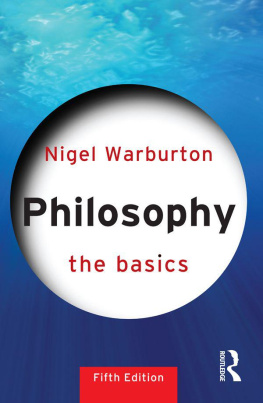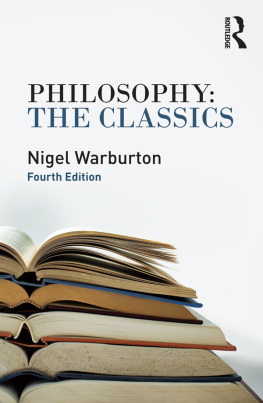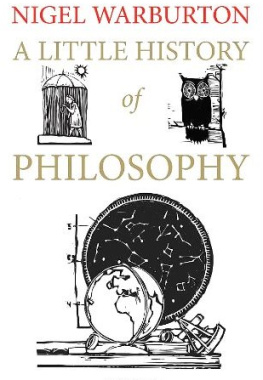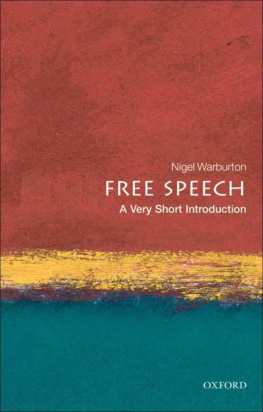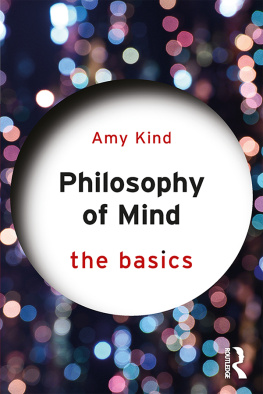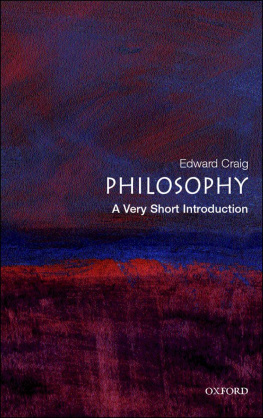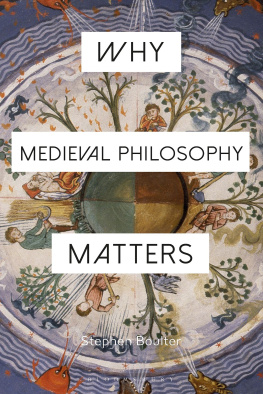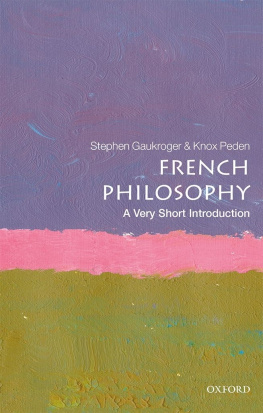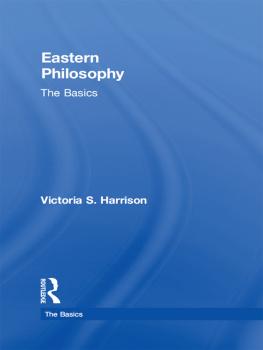Philosophy
The Basics
Philosophy: The Basics deservedly remains the most recommended introduction to philosophy on the market. Warburton is patient, accurate and, above all, clear. There is no better short introduction to philosophy.
Stephen Law, author of The Philosophy Gym
Philosophy: The Basics gently eases the reader into the world of philosophy. Each chapter considers a key area of philosophy, explaining and exploring the basic ideas and themes including:
- Can you prove God exists?
- How do we know right from wrong?
- How should we treat non-human animals?
- What are the limits of free speech?
- Do you know how science works?
- Is your mind different from your body?
- Can you define art?
For the fifth edition of this best-selling book, Nigel Warburton has added a new chapter on animals, revised others and brought the further reading sections up to date. If youve ever asked what is philosophy?, or wondered whether the world is really the way you think it is, this is the book for you.
Nigel Warburton is Senior Lecturer at The Open University. He is author of several books including Philosophy: The Classics, Philosophy: Basic Readings, Thinking from AZ , and The Basics of Essay Writing all published by Routledge. He is co-creator, with David Edmonds, of the popular philosophy podcast Philosophy Bites .
The Basics
ACTING
BELLA MERLIN
ANTHROPOLOGY
PETER METCALF
ARCHAEOLOGY (SECOND EDITION)
CLIVE GAMBLE
ART HISTORY
GRANT POOKE AND DIANA NEWALL
ARTIFICIAL INTELLIGENCE
KEVIN WARWICK
THE BIBLE
JOHN BARTON
BUDDHISM
CATHY CANTWELL
CONTEMPORARY LITERATURE
SUMAN GUPTA
CRIMINAL LAW
JONATHAN HERRING
CRIMINOLOGY (SECOND EDITION)
SANDRA WALKLATE
DANCE STUDIES
JO BUTTERWORTH
EASTERN PHILOSOPHY
VICTORIA S. HARRISON
ECONOMICS (SECOND EDITION)
TONY CLEAVER
EDUCATION
KAY WOOD
EUROPEAN UNION (SECOND EDITION)
ALEX WARLEIGH-LACK
EVOLUTION
SHERRIE LYONS
FILM STUDIES
AMY VILLAREJO
FINANCE (SECOND EDITION)
ERIK BANKS
HUMAN GENETICS
RICKI LEWIS
HUMAN GEOGRAPHY
ANDREW JONES
INTERNATIONAL RELATIONS
PETER SUTCH AND JUANITA ELIAS
ISLAM (SECOND EDITION)
COLIN TURNER
JOURNALISM STUDIES
MARTIN CONBOY
JUDAISM
JACOB NEUSNER
LANGUAGE (SECOND EDITION)
R. L. TRASK
LAW
GARY SLAPPER AND DAVID KELLY
LITERARY THEORY (SECOND EDITION)
HANS BERTENS
LOGIC
J. C. BEALL
MANAGEMENT
MORGEN WITZEL
MARKETING (SECOND EDITION)
KARL MOORE AND NIKETH PAREEK
MEDIA STUDIES
JULIAN MCDOUGALL
THE OLYMPICS
ANDY MIAH AND BEATRIZ GARCIA
PHYSICAL GEOGRAPHY
JOSEPH HOLDEN
POETRY (SECOND EDITION)
JEFFREY WAINWRIGHT
POLITICS (FOURTH EDITION)
STEPHEN TANSEY AND NIGEL JACKSON
THE QURAN
MASSIMO CAMPANINI
RACE AND ETHNICITY
PETER KIVISTO AND PAUL R. CROLL
RELIGION (SECOND EDITION)
MALORY NYE
RELIGION AND SCIENCE
PHILIP CLAYTON
RESEARCH METHODS
NICHOLAS WALLIMAN
ROMAN CATHOLICISM
MICHAEL WALSH
SEMIOTICS (SECOND EDITION)
DANIEL CHANDLER
SHAKESPEARE (THIRD EDITION)
SEAN MCEVOY
SOCIAL WORK
MARK DOEL
SOCIOLOGY
KEN PLUMMER
SPECIAL EDUCATIONAL NEEDS
JANICE WEARMOUTH
TELEVISION STUDIES
TOBY MILLER
TERRORISM
JAMES LUTZ AND BRENDA LUTZ
THEATRE STUDIES
ROBERT LEACH
WORLD HISTORY
PETER N. STEARNS
Philosophy
The Basics
FIFTH EDITION
Nigel Warburton

First edition published 1992
Second edition published 1995
Third edition published 1999
Fourth edition published 2004
Fifth edition published 2013
by Routledge
2 Park Square, Milton Park, Abingdon, Oxon OX14 4RN
Simultaneously published in the USA and Canada
by Routledge
711 Third Avenue, New York, NY 10017
Routledge is an imprint of the Taylor & Francis Group, an informa business
1992, 1995, 1999, 2004, 2013 Nigel Warburton
The right of Nigel Warburton to be identified as author of this work has been asserted by him in accordance with sections 77 and 78 of the Copyright, Designs and Patents Act 1988.
All rights reserved. No part of this book may be reprinted or reproduced or utilized in any form or by any electronic, mechanical, or other means, now known or hereafter invented, including photocopying and recording, or in any information storage or retrieval system, without permission in writing from the publishers.
Trademark notice : Product or corporate names may be trademarks or registered trademarks, and are used only for identification and explanation without intent to infringe.
British Library Cataloguing in Publication Data
A catalogue record for this book is available from the British Library
Library of Congress Cataloging in Publication Data
Warburton, Nigel, 1962-
Philosophy : the basics / Nigel Warburton. -- 5th ed.
p. cm.
Includes bibliographical references (p.) and index.
1. Philosophy--Introductions. I. Title.
BD21.W35 2012
100--dc23
2012006466
ISBN: 978-0-415-69317-2 (hbk)
ISBN: 978-0-415-69316-5 (pbk)
Typeset in Bembo and Scala Sans
by Taylor & Francis Books
For my mother
Contents
For this fifth edition I have added a new short chapter, Animals, and have made minor corrections and additions throughout. I have also brought the further reading up to date and have created webpages at www.philosophythebasics.com with links to relevant online resources including podcasts.
I would like to thank all those who commented on drafts of various chapters or helped in other ways. In particular, I am grateful to Alexandra Alexandri, Gunnar Arnason, Jennifer Burgess, Inga Burrows, Eric Butcher, Michael Camille, Simon Christmas, Lesley Cohen, Emma Cotter, Tim Crane, Sue Derry-Penz, Angie Doran, Adrian Driscoll, David Edmonds, Goober Fox, Jonathan Hourigan, Rosalind Hursthouse, Paul Jefferis, Maria Kasmirli, John Kimbell, Stephen Law, Robin Le Poidevin, Georgia Mason, Hugh Mellor, Alex Miller, Anna Motz, Penny Nettle, Alex Orenstein, Andrew Pyle, Abigail Reed, Anita Roy, Ron Santoni, Helen Simms, Jennifer Trusted, Phillip Vasili, Stephanie Warburton, Tessa Watt, Jonathan Wolff, Kira Zurawska, and the publishers anonymous readers.
Nigel Warburton
Oxford 2012
www.nigelwarburton.com
www.virtualphilosopher.com
www.philosophybites.com
www.twitter.com/philosophybites
What is philosophy? This is a notoriously difficult question. One of the easiest ways of answering it is to say that philosophy is what philosophers do, and then point to the writings of Plato, Aristotle, Descartes, Hume, Kant, Russell, Wittgenstein, Sartre, and other famous philosophers. However, this answer is unlikely to be of much use to you if you are just beginning the subject, as you probably wont have read anything by these writers. Even if you have, it may still be difficult to say what they have in common, if indeed there is a relevant characteristic which they all share. Another approach to the question is to point out that philosophy is derived from the Greek word meaning love of wisdom. However, this is rather vague and even less helpful than saying that philosophy is what philosophers do. So some very general comments about what philosophy is are needed.
Philosophy is an activity: it is a way of thinking about certain sorts of question. Its most distinctive feature is its use of logical argument. Philosophers typically deal in arguments: they either invent them, criticize other peoples, or do both. They also analyse and clarify concepts. The word philosophy is often used in a much broader sense than this to mean ones general outlook on life, or else to refer to some forms of mysticism. I will not be using the word in this broader sense here: my aim is to illuminate some of the key areas of discussion in a tradition of thought which began with the Ancient Greeks and flourished in the twentieth century, predominantly in Europe, North America, Australia, and New Zealand. This tradition looks set to continue well into the present century.
Next page
